Saudi Arabia was on a roll in the 1970s, enjoying the social and cultural developments that had begun in the previous two decades, and buoyed by the rising price of oil and the Kingdom’s first Development Plan.
But 1979 changed everything. Saudi Arabia took a conservative turn, prompted by two events: the Iranian Revolution in February, which brought Ayatollah Khomeini to power, and the siege by religious extremists of the Grand Mosque in Makkah.
OPINION: Reconnecting with the past, reimagining the future (Faisal J. Abbas, Editor-in-Chief, Arab News)
As Crown Prince Mohammed bin Salman told 2017’s Future Investment Initiative: “We were not like this in the past. We only want to go back to what we were, the moderate Islam that is open to the world, open to all the religions … And quite frankly, we will not waste 30 years of our lives in dealing with extremist ideas … We want to live a normal life, a life that translates our moderate religion, our good customs.”
And that’s what has happened. Under Vision 2030 and a flurry of life-altering developments – movies and concerts, greater freedom for women, fitness in schools, to name just a few – the Kingdom is on a trajectory back to the future.
— THEN —
1955 - Saudi Arabia’s first private school for girls, Dar Al-Hanan, is founded in Jeddah by Princess Effat, with the support of her husband, Crown Prince Faisal bin Abdul Aziz, amid a social outcry.
Read more: Saudi schooling goes back to the future
1960 - Royal decree approves public education for girls; schools are established in Riyadh, Makkah and other cities.
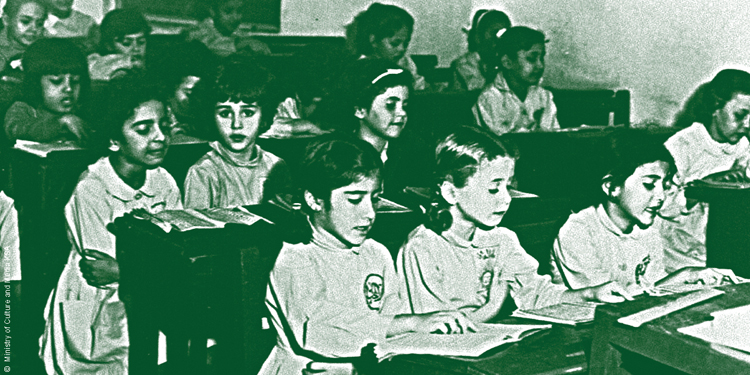
1962 - The non-profit women’s organization, Al-Nahda, is established by Princess Effat and a number of prominent Saudi women.
1963
- The Council of Ministers approves a project to establish television in the Kingdom.
- The Department of Youth Welfare (previously the Department of Sport) creates four federations: volleyball, basketball, athletic and cycling.
1965 - King Faisal approves the first national television broadcast, a reading of the Qur’an, amid protests from conservatives.
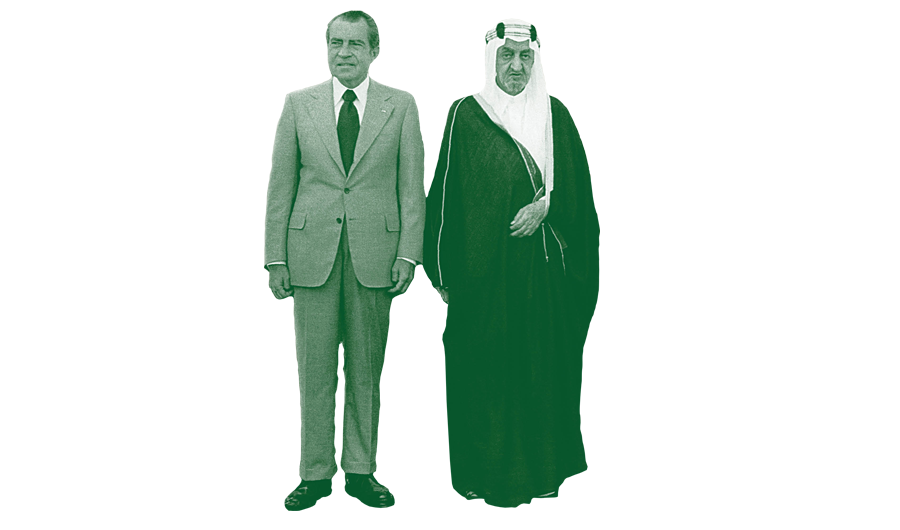
King Faisal (right) and US President Richard Nixon.
- The first TV broadcast in Saudi Arabia is launched from the US Consulate in Dhahran; “The Eye of the Desert” is broadcast in English and only to the Dhahran area.
Read more: Saudis look back on the dawn of broadcasting on Saudi National Day
1957
- The Kingdom’s first institute of higher education, King Saud University, is opened in Riyadh.
- The launch of Aramco TV, with a wider broadcasting range that reaches Al-Hofuf and other areas across the Gulf. Broadcasts are in both Arabic and English.
OPINION: The 1970s — a seismic decade for Saudi Arabia’s economy (Frank Kane)
1979
IRANIAN REVOLUTION
January 22 - Shah Mohammed Reza Pahlavi and his wife leave Tehran.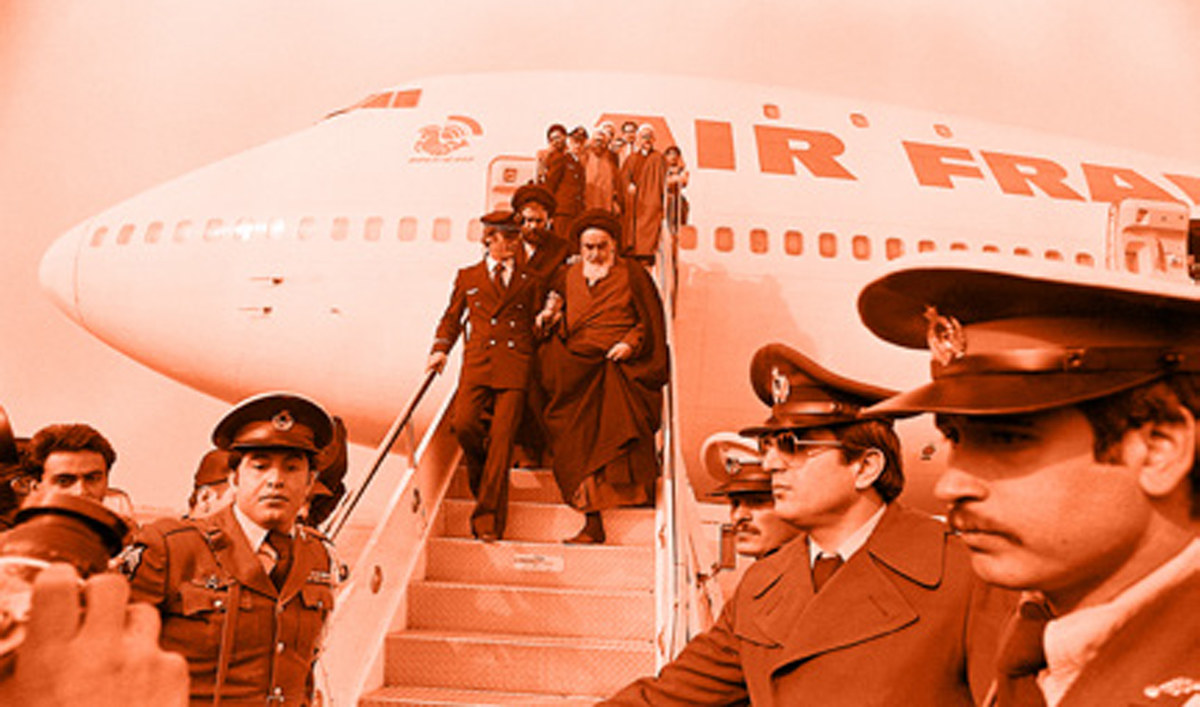
February 1 - Ayatollah Ruhollah Khomeini returns to Iran from exile in France.
February 11 - Khomeini officially assumes power when troops loyal to the shah surrender.
February 16 - Iran’s revolutionary authorities start executions of leading supporters of the shah, including four top generals.
November 4 - US embassy in Tehran stormed by Iranian students who take 52 Americans hostage, demanding the extradition of the shah.
OPINION: Why Iran’s ‘Awakening’ created a nightmare for the Gulf (Dr. Mohammed Al-Sulami)
SIEGE OF MAKKAH’S GRAND MOSQUE
November 20 - A well-organized group led by Saudi militant Juhayman Al-Otaibi storms the Grand Mosque with weapons smuggled in coffins and vehicles using members pretending to be there to pray. Al-Otaibi is a member of Al-Jamaa Al-Salafiya Al-
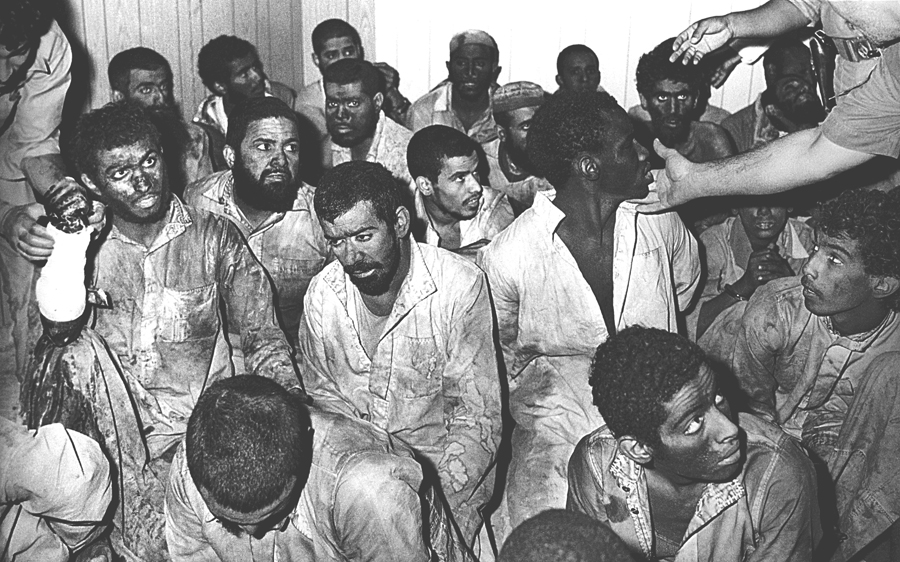
Militants arrested after the Makkah Siege of 1979 are escorted to prison. (File photo)
Muhtasiba (Salafi Group that Commands Right and Forbids Wrong), which is angered by Western social influence, women’s presence in the Saudi workforce, TV and other issues. Worshippers are prevented from leaving after the announcement of a takeover over a microphone. Hostages are forced to pledge allegiance to the group’s leader, Mohammed bin Abduallah Al-Qahtani, Al-Otaibi and their followers.
December 4 - The siege lasts for two weeks and ends after an intervention by Saudi special forces and their allies, leaving hundreds dead, including Saudi officers, soldiers and civilians as well as Al-Qahtani and his followers. Al-Otaibi is arrested and executed on Jan. 9, 1980.
Read more:
- ‘The air was heavy with fear’: Memories of Makkah’s Grand Mosque siege resurface on Saudi National Day
- MBC’s ‘Al-Asoof’ tells the untold story of the Makkah siege
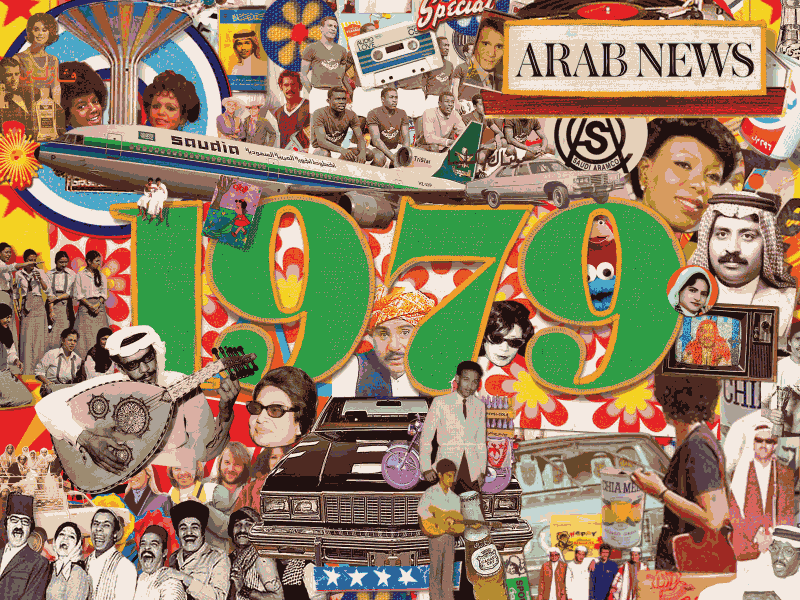
Arab News Saudi National Day cover wrap by collage artist Peter Quinnell. Check it out: https://tinyurl.com/y2cwarqo
— NOW —
2016
- Deputy Crown Prince Mohammed bin Salman unveils Vision 2030, a road map for Saudi Arabia’s future.
- The Saudi Cabinet approves a new law restricting the religious police from questioning, pursuing or arresting violators; they must instead report them to the police or anti-narcotics officers.
Read more: Saudi women celebrate new freedoms on Saudi National Day
- Princess Reema bint Bandar is appointed vice president for women’s affairs at the General Sports Authwority.
- Kariman Abuljadayel is the first Saudi woman to compete in the 100-meter event at the 2016 Summer Olympics in Brazil.
Read more: Sporting success puts Saudi Arabia on track for glory on Saudi National Day
- The General Authority for Entertainment and the General Sports Authority are established by royal decree.
2017
- King Salman appoints Mohammed bin Salman as crown prince ofSaudi Arabia.
-
The Saudi Stock Exchange appoints a woman, Sarah Al-Suhaimi, as chairperson for the first time.
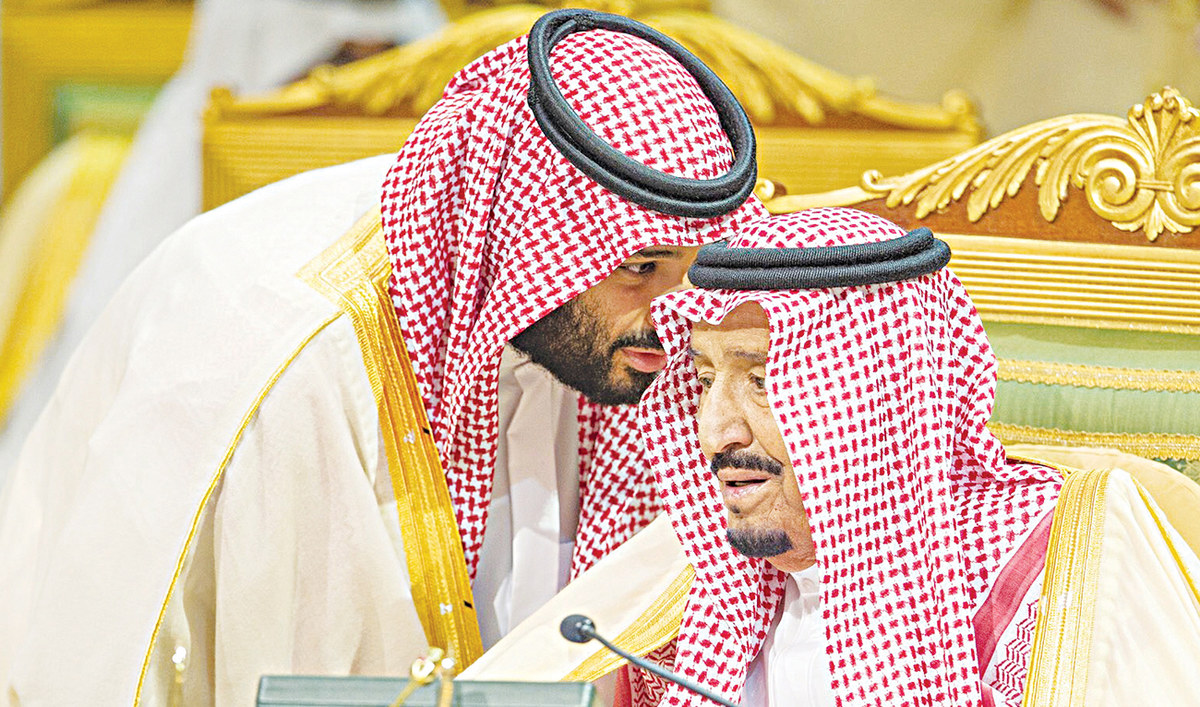
-
In one of the first public music performances in many years, Mohammed Abdo performs for a men-only audience in Jeddah.
- Giga-projects are launched: NEOM, a $500-billion megacity in theTabuk region, and the RedSea tourism project.
- Saudi state schools announce that they will offer physical education classes for female students.
- At the inaugural Future Investment Initiative in Riyadh, Crown Prince Mohammed bin Salman pledges a return to moderate Islam.
2018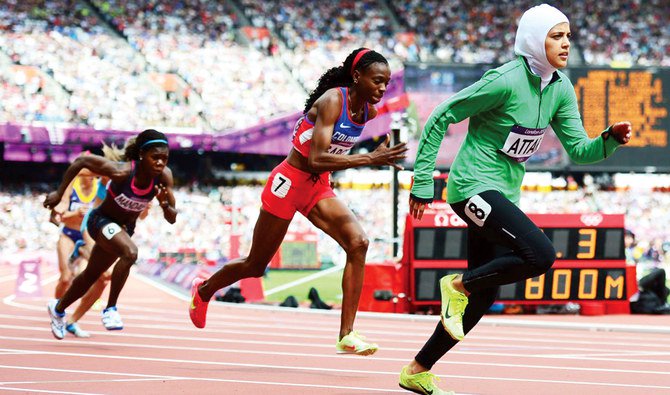
- Female fans are allowed to attend football matches for the first time in Saudi Arabia; the match was Al-Ahli vs. Al-Batin in Jeddah on Jan. 12.
- Ending a 35-year ban on cinemas, the first commercial movie theater opens in Riyadh with a screening of “Black Panther” on April 18.
- A ban on Saudi women driving is lifted on June 24.
- An anti-harassment law, approved by the Shoura Council, receives praise from around the world.
- King Salman launches plans for Qiddiya, expected to be the world’s largest entertainment city.
- The Culture Ministry, headed by Prince Badr bin Abdullah bin Mohammed bin Farhan Al-Saud, is established.
Read more: Saudi Arabia’s ‘cultural rebirth’ in spotlight on Saudi National Day
- Al-Ahsa Oasis is designated a UNESCO World Heritage site.
- Weam Al-Dakheel becomes the first Saudi woman to anchor the main evening news on Saudi TV.
- Enrique Iglesias, Amr Diab and the Black Eyed Peas are among the first international performers at the Formula E in Riyadh, for which the first trial tourist visas are granted.
- The WWE’s Royal Rumble takes place at Jeddah’s King Abdullah Sports City in Jeddah, beginning a 10-year partnership with the General Sports Authority.
2019
-
Crown Prince Mohammed bin Salman launches a mega tourism project in AlUla which will include a resort designed by renowned French architect Jean Nouvel and a nature reserve dubbed Sharaan.
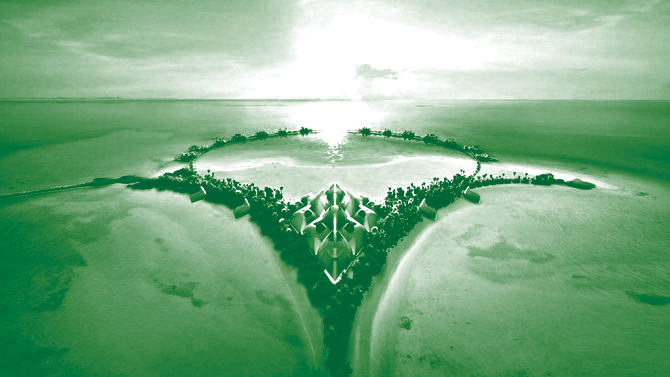
- Lubna Al-Olayan becomes the first Saudi chairwoman to run a Saudi bank, a merger between Alawwal and Saudi British Bank.
- Saudi Arabia’s first female ambassador, Princess Reema bint Bandar (top center), is appointed to Washington.
- The Saudi Cabinet approves a “Privileged Iqama residency permit,” which will allow foreign nationals to work and live in Saudi Arabia without a sponsor, offered to highly skilled expatriates and owners of capital funds.
- By royal decree, Saudi women no longer require permission from a male guardian to travel or obtain a passport.
- A lineup of superstars perform in concerts across the Kingdom: Mariah Carey, Janet Jackson and 50 Cent in Jeddah; Andrea Bocelli in AlUla; Pitbull and Akon in the Eastern Province.
- High-profile sports events include the Italian Super Cup between Juventus and AC Milan; Fight Night between world boxing champion Amir Khan and Billy Dib; and the largest Battle Royale in WWE history.































